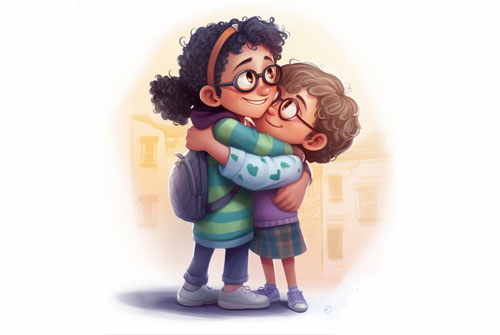Science, art, maths and physical play are all important, but being a good person is what really matters. Teaching children fundamental values like empathy and respect is not just a matter of instilling good manners, it’s about equipping them with essential life skills that will guide their interactions with others and carry them for the rest of their days.
In this blog post, we will explore why empathy and respect are crucial in building healthy relationships and offer guidance to parents and educators on how to impart these values to the next generation.
The Importance of empathy
Empathy is the ability to understand and share the feelings of another person. It’s the cornerstone of effective communication and the key to resolving conflicts peacefully. By teaching children empathy, we help them see the world from different perspectives, promoting tolerance and reducing prejudice.
Empathy is closely linked to emotional intelligence. When children learn to recognise and validate their own emotions and those of others, they become better equipped to navigate the complexities of human relationships. This emotional awareness helps them express themselves and respond empathetically to the feelings of others.
Empathetic individuals are more likely to engage in acts of kindness and compassion. By nurturing empathy in children, we contribute to the development of a more compassionate society. Empathetic children are more likely to stand up against bullying, discrimination and injustice when they see, and are more likely to become leaders of their peers.
The significance of respect
Respect is the foundation of every healthy relationship. It’s about recognising the inherent worth and dignity of every individual. Teaching children to respect others sets the stage for positive interactions and ensures.
Respect goes beyond mere politeness; it involves valuing diversity and differences. When children learn to respect others’ unique qualities, they embrace diversity as a source of strength rather than a cause for division. This acceptance of differences creates a more inclusive and harmonious world.
Teaching children respect also involves teaching them to respect themselves. When children have a healthy sense of self-respect, they are less likely to engage in self-destructive behaviours or tolerate disrespect from others. This self-respect is the cornerstone of self-esteem.
Teaching empathy and respect
So how can parents help set their kids on a course of emotional intelligence? Here are five ways you can practice teaching empathy and respect to the next generation.
Be a role model
Children learn by example. Demonstrate empathy and respect in your own interactions with others. When children see these values in action, they are more likely to emulate them.
Encourage perspective-taking
Help children see situations from different viewpoints. Ask questions like, “How do you think they feel?” or “What would you do in their shoes?” These questions encourage children to consider others’ feelings and experiences.
Read and discuss stories
Books are a powerful tool for teaching empathy and respect. Choose stories that feature diverse characters and explore themes of friendship, struggle and conflict. After reading, discuss the characters’ actions and feelings.
Practice active listening
Teach children the art of active listening. Encourage them to listen attentively when others are speaking and ask open-ended questions to show interest in their thoughts and feelings.
Resolve conflicts peacefully
When conflicts arise, use them as teaching moments. Encourage children to express their feelings calmly and help them find solutions that consider everyone’s needs and feelings. Smacking a child when they’re arguing only teaches them that violence wins the argument.
In a world that sometimes seems divided, teaching children the values of empathy and respect is a powerful way to foster unity and understanding. These values not only lead to healthier relationships but also contribute to a more compassionate and harmonious society. By instilling empathy and respect in the hearts and minds of our children, we empower them to become compassionate individuals who will make a positive impact on the world.

